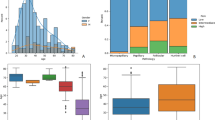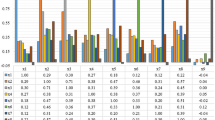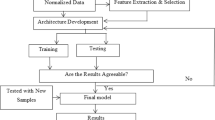Abstract
Background
This study aimed to investigate the clinical significance of machine-learning (ML) algorithms based on serum inflammatory markers to predict survival outcomes for patients with colorectal cancer (CRC).
Methods
The study included 941 patients with stages I to III CRC. Based on random forest algorithms using 15 compositions of inflammatory markers, four different prediction scores (DFS score-1, DFS score-2, DFS score-3, and DFS score-4) were developed for the Yonsei cohort (training set, n = 803) and tested in the Ulsan cohort (test set, n = 138). The Cox proportional hazards model was used to determine correlation between prediction scores and disease-free survival (DFS). Harrell’s concordance index (C-index) was used to compare the predictive ability of prediction scores for each composition.
Results
The multivariable analysis showed the DFS score-4 to be an independent prognostic factor after adjustment for clinicopathologic factors in both the training and test sets (hazard ratio [HR], 8.98; 95% confidence interval [CI] 6.7–12.04; P < 0.001 for the training set and HR, 2.55; 95% CI 1.1–5.89; P = 0.028 for the test set]. With regard to DFS, the highest C-index among single compositions was observed in the lymphocyte-to-C-reactive protein ratio (LCR) (0.659; 95% CI 0.656–0.662), and the C-index of DFS score-4 (0.727; 95% CI 0.724–0.729) was significantly higher than that of LCR in the test set. The C-index of DFS score-3 (0.725; 95% CI 0.723–0.728) was similar to that of DFS score-4, but higher than that of DFS score-2 (0.680; 95% CI 0.676–0.683).
Conclusions
The ML-based approaches showed prognostic utility in predicting DFS. They could enhance clinical use of inflammatory markers in patients with CRC.


Similar content being viewed by others
References
Tjandra JJ, Chan MK. Follow-up after curative resection of colorectal cancer: a meta-analysis. Dis Colon Rectum. 2007;50:1783–99.
Weiser MR, Chou JF, Keshinro A, et al. Development and assessment of a clinical calculator for estimating the likelihood of recurrence and survival among patients with locally advanced rectal cancer treated with chemotherapy, radiotherapy, and surgery. JAMA Netw Open. 2021;4:e2133457.
Kim MJ, Jeong SY, Choi SJ, et al. Survival paradox between stage IIB/C (T4N0) and stage IIIA (T1–2N1) colon cancer. Ann Surg Oncol. 2015;22:505–12.
Benson AB, Venook AP, Al-Hawary MM, et al. Colon cancer, version 2.2021, NCCN clinical practice guidelines in oncology. J Natl Compr Canc Netw. 2021;19:329–59.
Mantovani A, Allavena P, Sica A, Balkwill F. Cancer-related inflammation. Nature. 2008;454:436–44.
Sun K, Chen S, Xu J, Li G, He Y. The prognostic significance of the prognostic nutritional index in cancer: a systematic review and meta-analysis. J Cancer Res Clin Oncol. 2014;140:1537–49.
Koike Y, Miki C, Okugawa Y, et al. Preoperative C-reactive protein as a prognostic and therapeutic marker for colorectal cancer. J Surg Oncol. 2008;98:540–4.
Menter DG, Tucker SC, Kopetz S, Sood AK, Crissman JD, Honn KV. Platelets and cancer: a casual or causal relationship: revisited. Cancer Metastasis Rev. 2014;33:231–69.
Feng Y, Luo J, Liu P, et al. Glasgow prognostic score and combined positive score for locally advanced rectal cancer. Ann Surg Treat Res. 2022;102:153–8.
Li MX, Liu XM, Zhang XF, et al. Prognostic role of neutrophil-to-lymphocyte ratio in colorectal cancer: a systematic review and meta-analysis. Int J Cancer. 2014;134:2403–13.
Song W, Wang K, Zhang RJ, Zou SB. Prognostic value of the lymphocyte monocyte ratio in patients with colorectal cancer: a meta-analysis. Med Baltim. 2016;95:e5540.
Son W, Shin SJ, Park SH, et al. Clinical impact of combined modified Glasgow prognostic score and C-reactive protein/albumin ratio in patients with colorectal cancer. Diagnostics (Basel). 2020;10(11):859.
Dolan RD, McSorley ST, Park JH, et al. The prognostic value of systemic inflammation in patients undergoing surgery for colon cancer: comparison of composite ratios and cumulative scores. Br J Cancer. 2018;119:40–51.
Shrotriya S, Walsh D, Bennani-Baiti N, Thomas S, Lorton C. C-reactive protein is an important biomarker for prognosis tumor recurrence and treatment response in adult solid tumors: a systematic review. PLoS One. 2015;10(12):e0143080.
An S, Shim H, Kim K, et al. Pretreatment inflammatory markers predicting treatment outcomes in colorectal cancer. Ann Coloproctol. 2022;38:97–108.
Suzuki S, Akiyoshi T, Oba K, et al. Comprehensive comparative analysis of prognostic value of systemic inflammatory biomarkers for patients with stage II/III colon cancer. Ann Surg Oncol. 2020;27:844–52.
Zhang QX, Xu BB, Xue Z. Comment on “lymphocyte-C-reactive protein ratio as promising new marker for predicting surgical and oncological outcomes in colorectal cancer. Ann Surg. 2021;274:e689–90.
Kourou K, Exarchos TP, Exarchos KP, Karamouzis MV, Fotiadis DI. Machine-learning applications in cancer prognosis and prediction. Comput Struct Biotechnol J. 2015;13:8–17.
Pan L, Liu G, Lin F, et al. Machine-learning applications for prediction of relapse in childhood acute lymphoblastic leukemia. Sci Rep. 2017;7:7402.
Taylor JM. Random survival forests. J Thorac Oncol. 2011;6:1974–5.
Ambale-Venkatesh B, Yang X, Wu CO, et al. Cardiovascular event prediction by machine learning: the multi-ethnic study of atherosclerosis. Circ Res. 2017;121:1092–101.
Okugawa Y, Toiyama Y, Yamamoto A, et al. Lymphocyte-C-reactive protein ratio as promising new marker for predicting surgical and oncological outcomes in colorectal cancer. Ann Surg. 2020;272:342–51.
Camp RL, Dolled-Filhart M, Rimm DL. X-tile: a new bio-informatics tool for biomarker assessment and outcome-based cut-point optimization. Clin Cancer Res. 2004;10:7252–9.
Howard R, Kanetsky PA, Egan KM. Exploring the prognostic value of the neutrophil-to-lymphocyte ratio in cancer. Sci Rep. 2019;9:19673.
Acknowledgements
This work was supported by the National Research Foundation of Korea (NRF) grant funded by the Korea government (MSIT) (no. 2022R1F1A1074811). This study was supported by 2022 Research Grant from Kangwon National University and the National Research Foundation of Korea (NRF) grant funded by the Korea government (MSIT) (no. 2022R1F1A1075186). We thank Editage (www.editage.co.kr) for English language editing.
Author information
Authors and Affiliations
Corresponding authors
Ethics declarations
Disclosures
There are no conflicts of interest.
Additional information
Publisher's Note
Springer Nature remains neutral with regard to jurisdictional claims in published maps and institutional affiliations.
Supplementary Information
Below is the link to the electronic supplementary material.
Rights and permissions
Springer Nature or its licensor (e.g. a society or other partner) holds exclusive rights to this article under a publishing agreement with the author(s) or other rightsholder(s); author self-archiving of the accepted manuscript version of this article is solely governed by the terms of such publishing agreement and applicable law.
About this article
Cite this article
Yang, S., Jang, H., Park, I.K. et al. Machine-Learning Algorithms Using Systemic Inflammatory Markers to Predict the Oncologic Outcomes of Colorectal Cancer After Surgery. Ann Surg Oncol 30, 8717–8726 (2023). https://doi.org/10.1245/s10434-023-14136-5
Received:
Accepted:
Published:
Issue Date:
DOI: https://doi.org/10.1245/s10434-023-14136-5




